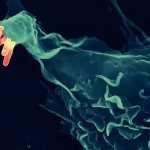Lien vers Pubmed [PMID] – 35487154
Lien DOI – S0955-0674(22)00027-810.1016/j.ceb.2022.102081
Curr Opin Cell Biol 2022 Jun; 76(): 102081
Numerous bacterial pathogens “confine” themselves within host cells with an intracellular localization as main or exclusive niche. Many of them switch dynamically between a membrane-bound or cytosolic lifestyle. This requires either membrane damage and/or repair of the bacterial-containing compartment. Niche switching has profound consequences on how the host cell recognizes the pathogens in time and space for elimination. Moreover, niche switching impacts how bacteria communicate with host cells to obtain nutrients, and it affects the accessibility to antibiotics. Understanding the local environments and cellular phenotypes that lead to niche switching is critical for developing new host-targeted antimicrobial strategies, and has the potential to shed light into fundamental cellular processes.

